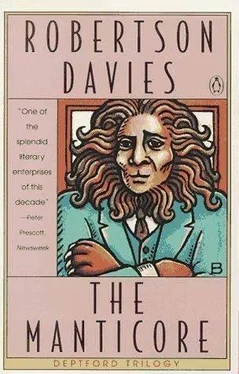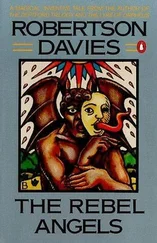Robertson Davies - The Manticore
Здесь есть возможность читать онлайн «Robertson Davies - The Manticore» весь текст электронной книги совершенно бесплатно (целиком полную версию без сокращений). В некоторых случаях можно слушать аудио, скачать через торрент в формате fb2 и присутствует краткое содержание. Жанр: Триллер, на английском языке. Описание произведения, (предисловие) а так же отзывы посетителей доступны на портале библиотеки ЛибКат.
- Название:The Manticore
- Автор:
- Жанр:
- Год:неизвестен
- ISBN:нет данных
- Рейтинг книги:3 / 5. Голосов: 1
-
Избранное:Добавить в избранное
- Отзывы:
-
Ваша оценка:
- 60
- 1
- 2
- 3
- 4
- 5
The Manticore: краткое содержание, описание и аннотация
Предлагаем к чтению аннотацию, описание, краткое содержание или предисловие (зависит от того, что написал сам автор книги «The Manticore»). Если вы не нашли необходимую информацию о книге — напишите в комментариях, мы постараемся отыскать её.
The Manticore — читать онлайн бесплатно полную книгу (весь текст) целиком
Ниже представлен текст книги, разбитый по страницам. Система сохранения места последней прочитанной страницы, позволяет с удобством читать онлайн бесплатно книгу «The Manticore», без необходимости каждый раз заново искать на чём Вы остановились. Поставьте закладку, и сможете в любой момент перейти на страницу, на которой закончили чтение.
Интервал:
Закладка:
A strange conduit through which to convey the good blood Father thought we Stauntons must have. But then Father had never troubled to pretend that he had much regard for Doc Staunton. Which was strange in itself, in a way, for Father was very strong on the regard children should have for parents. Not that he ever said so directly, or urged Caroline and me to honour our father and mother. But I recall that he was down on H. G. Wells, because in his Experiment in Autobiography Wells had said frankly that his parents weren't up to much and that escape from them was his first step toward a good life. Father was not consistent. But Doc Staunton had been consistent, and what had consistency made of him?
The hunt was up, and Doc Staunton was the fox.
Notes from Pledger-Brown punctuated the year that followed. He wrote an elegant Italic hand, as became a genealogist, and scraps of intelligence would arrive by the college messenger service: " Wallowcrop Cumberland dialect word. Am following up this clue. A.P-B." And, "Sorry to say nothing comes of enquiries in Cumberland. Am casting about in Lincoln." Or, "Tally-ho! A Henry Staunton born 1866 in Somerset!" followed a week later by, "False scent; Somerset Henry died aged 3 mos." Clearly he was having a wonderful adventure, but I had little time to think about it. I was up to my eyes in Jurisprudence, that formal science of positive law, and in addition to formal studies Pargetter was making me read Kelly's Famous Advocates and Their Speeches and British Forensic Eloquence aloud to him, dissecting the rhetoric of notable counsel and trying to make some progress in that line myself. Pargetter was determined that I should not be what he called an ignorant pettifogger, and he made it clear that as a Canadian I started well behind scratch in the journey toward professional literacy and elegance.
" 'The law, besides being a profession, is one of the humanities,' " he said to me one day, and I knew from the way he spoke he was quoting. "Who said that?" I didn't know. "Then never forget that it was one of your countrymen, your present Prime Minister, Louis St. Laurent," he said, punching me sharply in the side, as he often did when he wanted to make a point. "It's been said before, but it's never been said better. Be proud it was a Canadian who said it." And he went on to belabour me, as he had often done before, with Sir Walter Scott's low opinion of lawyers who knew nothing of history or literature; from these studies, said he, I would learn what people were and how they might be expected to behave. "But wouldn't I learn that from clients?" I asked, to try him. "Clients!" he said, and I would not have believed anyone could make a two-syllable word stretch out so long; "you'll learn precious little from clients except folly and duplicity and greed. You've got to stand above that."
Working as I was under the English system I had to be a member of one of the Inns of Court and go to London at intervals to eat dinners in its Hall; I was enrolled in the Middle Temple, and reverently chewed through the thirty-six obligatory meals. I liked it. I liked the ceremony and solemnity of the law, not only as safeguards against trivializing of the law but as pleasant observances in themselves. I visited the courts, studied the conduct and courtesy of their workings, and venerated judges who seemed able to carry a mass of detail in their heads and boil it down and serve it up in a kind of strong judicial consomme for the jury when all the pleading and testimony were over. I liked the romance of it, the star personalities of the great advocates, the swishing of gowns and flourishing of impractical but traditional blue bags full of papers. I was delighted that although most people seemed to use more modern instruments, everybody had access to quill pens, and could doubtless have called for sand to do their blotting, with full confidence that sand would have been forthcoming. I loved wigs, which established a hierarchy that was palpable and turned unremarkable faces into the faces of priests serving a great purpose. What if all this silk and bombazine and horsehair awed and even frightened the simple people who came to court for justice? It would do them no harm to be a little frightened. Everybody in court, except the occasional accused creature in the dock, seemed calmed, reft from the concerns of everyday; those who were speaking on oath seemed to me, very often, to be revealing an aspect of their best selves. The juries took their duties seriously, like good citizens. It was an arena in which gladiators struggled, but the end for which they struggled was that right, so far as right could be determined, should be done.
I was not naive. That is how I think of courts still. I am one of the very few lawyers I know who keeps his gown beautifully clean, whose collar and bands and cuffs are almost foppishly starched, whose striped trousers are properly pressed, whose shoes gleam. I am proud that the newspapers often say I cut an elegant figure in court. The law deserves that. The law is elegant. Pargetter took good care that I should not be foolishly romantic about the law, but he knew that there was a measure of romance in my attitude toward it, and if he had thought it should be rooted out, he would have done so. One day he paid me a walloping great compliment.
"I think you'll make an advocate," said he. "You have the two necessities, ability and imagination. A good advocate is his client's alter ego ; his task is to say what his client would say for himself if he had the knowledge and the power. Ability goes hand in hand with the knowledge: the power is dependent on imagination. But when I say imagination I mean capacity to see all sides of a subject and weigh all possibilities; I don't mean fantasy and poetry and moonshine; imagination is a good horse to carry you over the ground, not a flying carpet to set you free from probability."
I think I grew a foot, spiritually, that day.
DR. VON HALLER: So you might. And how lucky you were. Not everybody encounters a Pargetter. He is a very important addition to your cast of characters.
MYSELF: I don't think I follow you. What I am telling you is history, not invention.
DR. VON HALLER: Oh, quite. But even history has characters, and a personal history like yours must include a few people whom it would be stupid to call stock characters, even though they appear in almost all complete personal histories. Or let us put it differently. You remember the little poem by Ibsen that I quoted to you during one of our early meetings?
MYSELF: Only vaguely. Something about self-judgement.
DR. VON HALLER: No, no; self-judgement comes later. Now pay attention, please:
To live is to battle with trolls
in the vaults of heart and brain.
To write : that is to sit
in judgement over one's self.
MYSELF: But I have been writing constantly; everything I have told you has been based on careful notes; I have tried to be as clear as possible, to follow Ramsay's Plain Style. I have raked up some stuff I have never told to another living soul. Isn't this self-judgement?
DR. VON HALLER: Not at all. This has been the history, of your battle with the trolls.
MYSELF: Another of your elaborate metaphors?
DR. VON HALLER: If you like. I use metaphor to spare you jargon. Now consider: what figures have we met so far in our exploration of your life? Your Shadow; there was no difficulty about that, I believe, and we shall certainly meet him again. The Friend: Felix was the first to play that part, and you may yet come to recognize Knopwood as a very special friend, though I know you are still bitter against him. The Anima; you are very rich there, for of course there were your mother and Caroline and Netty, who all demonstrate various aspects of the feminine side of life, and finally Judy. This figure has been in eclipse for some years, at least in its positive aspect; I think we must count your stepmother as an Anima-figure, but not a friendly one; we may still find that she is not so black as you paint her. But there are happy signs that the eclipse is almost over. because of your dream – let us be romantic and call it The Maiden and the Manticore – in which you were sure you recognized me. Perfectly in order. I have played all of these roles at various stages of our talks. Necessarily so: an analysis like this is certainly not emotion recollected in tranquillity. You may call these figures many things. You might call them the Comedy Company of the Psyche, but that would be flippant and not do justice to the cruel blows you have had from some of them. In my profession we call them archetypes, which means that they represent and body forth patterns toward which human behaviour seems to be disposed; patterns which repeat themselves endlessly, but never in precisely the same way. And you have just been telling me about one of the most powerful of all, which we may call the Magus, or the Wizard, or the Guru, or anything that signifies a powerful formative influence toward the development of the total personality. Pargetter appears to have been a very fine Magus indeed: a blind genius who accepts you as an apprentice in his art! But he has just turned up, which is unusual though not seriously so. I had expected him earlier. Knopwood looked rather like a Magus for a time, but we shall have to see if any of his influence lasted. But the other man, the possible father, the man you call Old Buggerlugs – I had expected rather more from him. Have you been keeping anything back?
Читать дальшеИнтервал:
Закладка:
Похожие книги на «The Manticore»
Представляем Вашему вниманию похожие книги на «The Manticore» списком для выбора. Мы отобрали схожую по названию и смыслу литературу в надежде предоставить читателям больше вариантов отыскать новые, интересные, ещё непрочитанные произведения.
Обсуждение, отзывы о книге «The Manticore» и просто собственные мнения читателей. Оставьте ваши комментарии, напишите, что Вы думаете о произведении, его смысле или главных героях. Укажите что конкретно понравилось, а что нет, и почему Вы так считаете.












